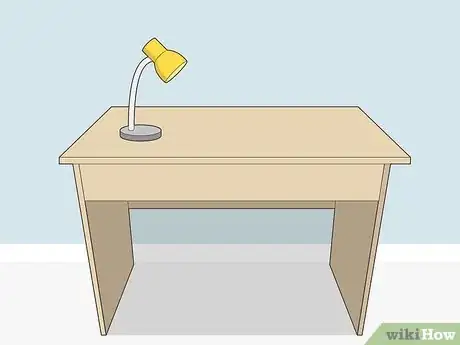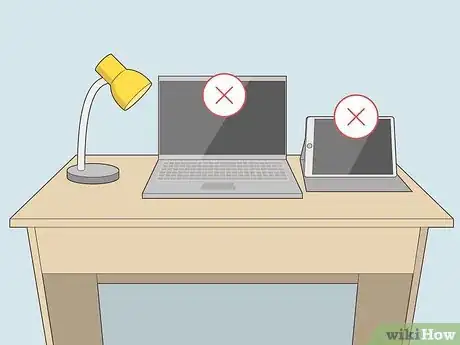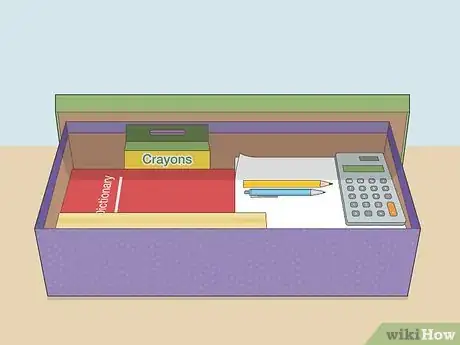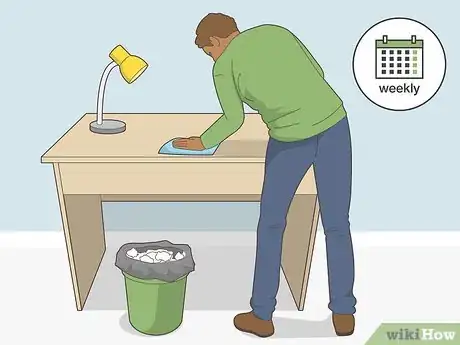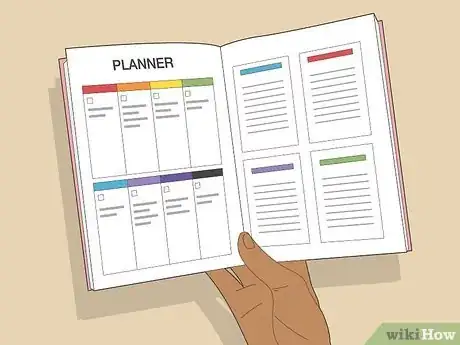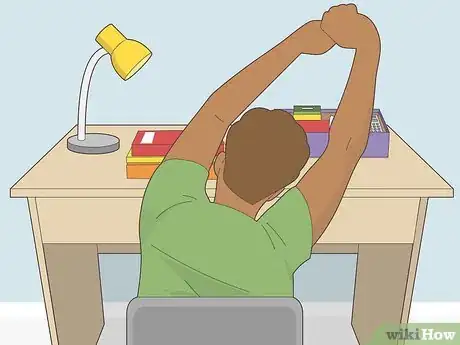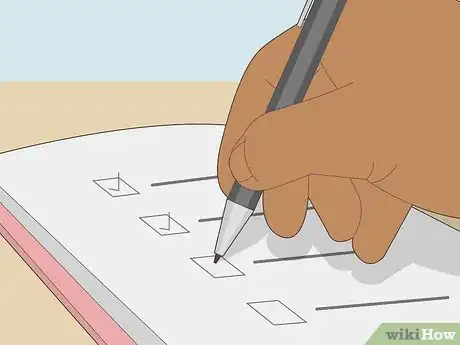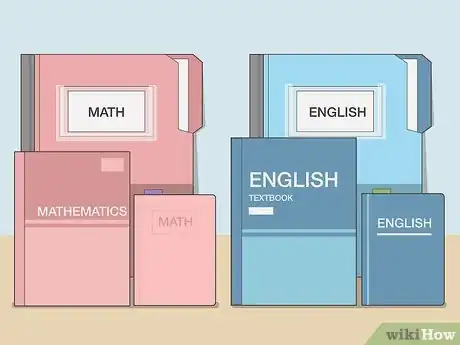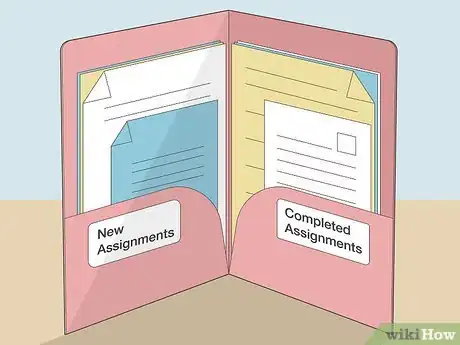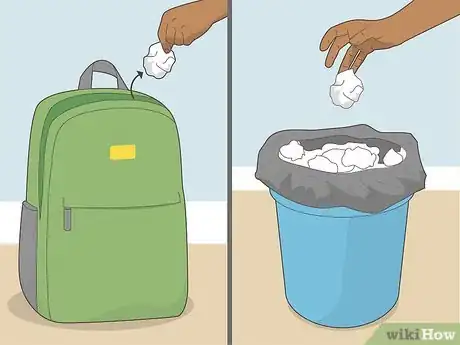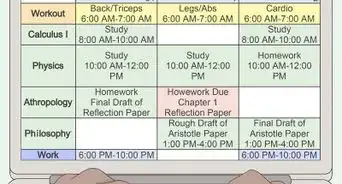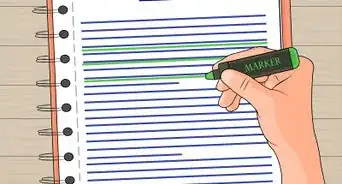This article was co-authored by Alexander Ruiz, M.Ed.. Alexander Ruiz is an Educational Consultant and the Educational Director of Link Educational Institute, a tutoring business based in Claremont, California that provides customizable educational plans, subject and test prep tutoring, and college application consulting. With over a decade and a half of experience in the education industry, Alexander coaches students to increase their self-awareness and emotional intelligence while achieving skills and the goal of achieving skills and higher education. He holds a BA in Psychology from Florida International University and an MA in Education from Georgia Southern University.
wikiHow marks an article as reader-approved once it receives enough positive feedback. In this case, several readers have written to tell us that this article was helpful to them, earning it our reader-approved status.
This article has been viewed 75,787 times.
Organizing your homework can be a big help for your academic success. Sloppy organization can make it difficult to keep track of assignments. To organize your homework, make sure you keep your study space and supplies neat. Prioritize your assignments by tracking deadlines and due dates. Lastly, keep track of all your school supplies. Use color-coordinated folders to make sure you know where to get all your assignments, worksheets, and papers.
Steps
Organizing Your Space and Supplies
-
1Select a study space. Choose a space that's quiet and unlikely to have a lot of distractions. Ideally, pick a spot in your home. This way, you can have all your study supplies in one place and won't have to carry them from place to place. An office or den in your home, a desk in your bedroom, or the kitchen table can work great as a study space.[1]
- Make sure you find a space with good lighting. Dim lights will make it hard to focus.
- Select a spot that's free of loud noises or commotion.
- Make sure the spot has good seating. If you're slouching or feel strained, you'll struggle to focus on your homework.
- Find a space with a big desk or table you can use to spread out your supplies.
-
2Minimize distractions in your study space. You want to make sure you leave distractions out of your study space. Unless you need them for an assignment, keep electronic devices like laptops, phones, and iPads/iPods out of your study space. Make sure the space where you work is quiet. Do not study in front of the television, for example.[2]Advertisement
-
3Create a home study kit. A home study kit can be placed near your work station. It should include all the items you need to get your work done. You can keep these items in a small container, like a shoebox. Fill it with some of the following, and anything else you need for homework on a daily basis:[3]
- Pens and pencils
- Scrap paper
- A calculator
- Ruler
- Crayons or pens
- A dictionary and/or thesaurus
-
4Clean your study space each week. You need to keep your study space neat. After it's set up, it will start to fall apart quickly if you don't clean it regularly. At the end of each week, give you study space a quick cleaning.[4]
- Remove any old tests and papers. Place them in a separate area, or recycle them if you no longer need them.
- If you were eating or drinking anything in your study space, remove it from the area.
Prioritizing Assignments Effectively
-
1Keep a planner. A planner is an important tool when it comes to organization. Go to a department store or office supply store and choose a nice planner. Use it to keep track of assignments and upcoming tests and quizzes.[5]
- Write down homework assignments as they're assigned. You should also flip ahead in the planner and mark when something is due.
- If you have a syllabus with the dates of tests, quizzes, and due dates, go ahead and write down these dates in your planner.
- Carry your planner to each class and refer to it at home when doing your homework.
- As an alternative to a planner, you could mark due dates on an electronic or paper calendar.
- In order to avoid feeling overwhelmed by leaving important assignments to the last minute, plan ahead to do important assignments when they are not urgent.[6]
-
2Choose a time each day to work. You want to get on a schedule. This will help you stay organized and on top of assignments. Try to choose a specific time each day to do homework. Strive to stick to the schedule, even on the days you are busy or feel stressed.[7]
- However, if you don’t have a deadline approaching, you may want to avoid studying when you’re really stressed as it can affect your focus.
- While you may want to get your homework over with, studying right after school may not be the best idea. Give yourself an hour or so to unwind before attempting your homework.
- Find a time that works each day. You could try to do your homework about an hour after school, shortly before dinner, for example.
- If you're behind on many of your assignments, try scheduling a "homework retreat" over the weekend to get everything done, complete with breaks, snacks, rewards, and energizers.[8]
-
3Take short breaks between assignments. It might be best not to work through all your homework at once, especially if you have a lot of homework that week. When you start to feel stressed, take a break. Or, use breaks as predetermined “rewards” for working for a certain amount of time (like 30 minutes) or finishing an assignment.[9]
- Set goals and checkpoints to stay focused during your study time. Deciding to take a break after you finish a certain amount of work can make your study time more effective.
- You can do something fun for a few minutes, like returning some text messages, watching a video online, or reading for fun.
- You can also simply get up and move around. Light physical activity, such as stretching or walking around, can really help you regain your focus.
-
4Make checklists. Checklists can help you keep track of everything you need to get done. Have a to-do list for each day where you write down all your homework assignments.[10]
- In addition to writing down homework assignments, a to-do list can also help you break down big tasks. You can, for example, decide to write 1 page of a 5-page paper every day leading up to the due date. You can write something on your checklist like, "Write 1 page of research paper."
- When you finish an assignment, cross it off your list. This can help you feel accomplished.
Keeping Track of School Supplies
-
1Color-code your supplies by class. Color-coding is a classics means of organization. If you color-code your class supplies, you'll be able to quickly find the right materials when doing homework.[11]
- You should try to color-code all your course materials. For example, have a pink textbook cover, pink folder, and pink notebook for your math class. For your English class, have a blue textbook cover, blue folder, and blue notebook.
-
2Create a system for storing your papers. It's a good idea to have each folder for your separate classes follow a specific organization structure. This way, you'll be able to better keep track of papers between classes.[12]
- You can use 1 side of your folder store new assignments, while the other stores completed assignments and in-class activities.
- You can also have separate sections for things like syllabi and assignment sheets. In addition to having a folder for each class, keep a folder where you store these types of papers.
- You should also have an electronic storage system in place. You should, for example, have separate folders on your desktop for each class.
-
3Keep all your school supplies in 1 space. You should have all your study materials in once place in your home. You should also have a small pencil box or other small container to carry to school. Keep things like a pair of scissors, a calculator, pens, pencils, and other items you need in this box.[13]
- You can even organize how you store your supplies. If you, say, have a lot of materials you need for math class, have a separate container for math class.
-
4Clean out your backpack and folders regularly. As with your study space, backpacks and folders benefit from regular cleaning. Clean them out once every couple of weeks. Remove any papers you no longer need, and any other garbage that has built up.[14]
- Be careful when throwing out papers, however. You never know when you may need to refer back to a homework assignment. It may be a good idea to store all your old papers in 1 place and only recycle them at the end of the semester.
Community Q&A
-
QuestionHow do you organize your homework?
 Alexander Ruiz, M.Ed.Alexander Ruiz is an Educational Consultant and the Educational Director of Link Educational Institute, a tutoring business based in Claremont, California that provides customizable educational plans, subject and test prep tutoring, and college application consulting. With over a decade and a half of experience in the education industry, Alexander coaches students to increase their self-awareness and emotional intelligence while achieving skills and the goal of achieving skills and higher education. He holds a BA in Psychology from Florida International University and an MA in Education from Georgia Southern University.
Alexander Ruiz, M.Ed.Alexander Ruiz is an Educational Consultant and the Educational Director of Link Educational Institute, a tutoring business based in Claremont, California that provides customizable educational plans, subject and test prep tutoring, and college application consulting. With over a decade and a half of experience in the education industry, Alexander coaches students to increase their self-awareness and emotional intelligence while achieving skills and the goal of achieving skills and higher education. He holds a BA in Psychology from Florida International University and an MA in Education from Georgia Southern University.
Educational Consultant Invest the time and energy to find a time management style that works for you! I advocate for students to learn Steven Covey's Theory of Prioritization, where to-do's are categorized according to their urgency and importance. This can help you practice doing assignments before they become both urgent and important, which can be a major stressor.
Invest the time and energy to find a time management style that works for you! I advocate for students to learn Steven Covey's Theory of Prioritization, where to-do's are categorized according to their urgency and importance. This can help you practice doing assignments before they become both urgent and important, which can be a major stressor. -
QuestionHow do you finish homework fast?
 Alexander Ruiz, M.Ed.Alexander Ruiz is an Educational Consultant and the Educational Director of Link Educational Institute, a tutoring business based in Claremont, California that provides customizable educational plans, subject and test prep tutoring, and college application consulting. With over a decade and a half of experience in the education industry, Alexander coaches students to increase their self-awareness and emotional intelligence while achieving skills and the goal of achieving skills and higher education. He holds a BA in Psychology from Florida International University and an MA in Education from Georgia Southern University.
Alexander Ruiz, M.Ed.Alexander Ruiz is an Educational Consultant and the Educational Director of Link Educational Institute, a tutoring business based in Claremont, California that provides customizable educational plans, subject and test prep tutoring, and college application consulting. With over a decade and a half of experience in the education industry, Alexander coaches students to increase their self-awareness and emotional intelligence while achieving skills and the goal of achieving skills and higher education. He holds a BA in Psychology from Florida International University and an MA in Education from Georgia Southern University.
Educational Consultant Stay motivated! In order to incentivize yourself to stay motivated, you can give yourself little rewards every time you finish an assignment or reach a checkpoint.
Stay motivated! In order to incentivize yourself to stay motivated, you can give yourself little rewards every time you finish an assignment or reach a checkpoint. -
QuestionI have a sports to do every day so I don't have that much time for homework. Is there a way to make that easier?
 Alexander Peterman, MAAlexander Peterman is a Private Tutor in Florida. He received his MA in Education from the University of Florida in 2017.
Alexander Peterman, MAAlexander Peterman is a Private Tutor in Florida. He received his MA in Education from the University of Florida in 2017.
Test Prep Tutor Hi! Even with sports, organization of your time is key. Put those times dedicated to sports on your calendar or in your planner and try your best to pre-write your schedule around those times so that you can limit stress. Be sure to start all your assignments early since you have less time to allot to your work!
Hi! Even with sports, organization of your time is key. Put those times dedicated to sports on your calendar or in your planner and try your best to pre-write your schedule around those times so that you can limit stress. Be sure to start all your assignments early since you have less time to allot to your work!
Warnings
- Take your time so you don't make mistakes. It's better to take longer to do your homework than turn in less than your best work. But also make sure you give your assignments in in time.⧼thumbs_response⧽
References
- ↑ http://www.smead.com/hot-topics/homework-tips-1391.asp
- ↑ http://kidshealth.org/en/teens/focused.html#
- ↑ http://www.scholastic.com/parents/resources/article/homework-project-tips/organize-homework-to-dos
- ↑ http://www.familyeducation.com/life/getting-organized/ten-ways-help-your-child-get-organized
- ↑ https://www.psychologytoday.com/blog/thinking-about-kids/201201/keep-your-middle-schooler-organized
- ↑ Alexander Ruiz, M.Ed.. Educational Consultant. Expert Interview. 25 June 2020.
- ↑ http://www.familyeducation.com/life/getting-organized/ten-ways-help-your-child-get-organized
- ↑ Alexander Ruiz, M.Ed.. Educational Consultant. Expert Interview. 25 June 2020.
- ↑ http://kidshealth.org/en/teens/focused.html#
- ↑ http://www.familyeducation.com/life/getting-organized/ten-ways-help-your-child-get-organized
- ↑ http://www.smead.com/hot-topics/homework-tips-1391.asp
- ↑ http://www.smead.com/hot-topics/homework-tips-1391.asp
- ↑ http://www.smead.com/hot-topics/homework-tips-1391.asp
- ↑ http://kidshealth.org/en/teens/focused.html#
